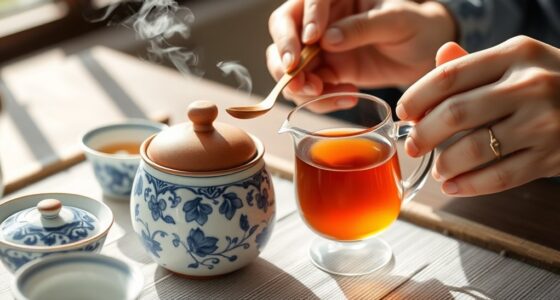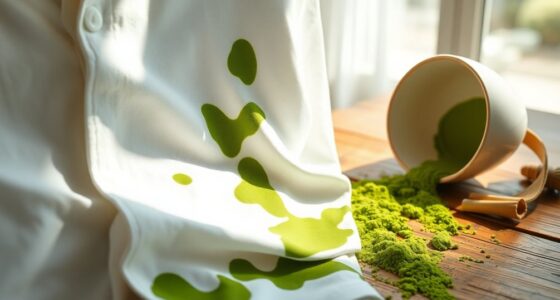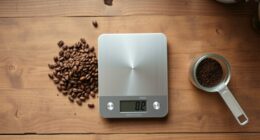Rooibos tea is a safe and nutritious choice for breastfeeding moms. It's caffeine-free and packed with antioxidants, essential minerals, and calming properties, making it beneficial for both you and your baby. Stick to one or two cups daily to avoid excessive exposure, and always monitor your baby's response to new herbs. Opt for organic varieties to minimize chemical exposure, and remember to hydrate well. While rooibos has many benefits, there are other herbs to be cautious of during breastfeeding. To discover these and more dietary tips, keep exploring the various aspects of safe tea consumption.
Key Takeaways
- Rooibos tea is caffeine-free and rich in antioxidants, making it a safe and healthy choice for breastfeeding mothers.
- Limit consumption to one or two cups daily to avoid excessive herbal exposure and monitor the baby's response.
- Choose organic rooibos to reduce chemical exposure and ensure proper hydration by drinking water alongside herbal teas.
- Consult a healthcare provider before introducing rooibos or any new herbs to your diet while breastfeeding.
- Be aware of herbs to avoid, such as sage and peppermint, which may negatively impact milk supply.
Understanding Rooibos Tea

Rooibos tea, with its vibrant red color and distinct flavor, is an herbal beverage that hails from South Africa. This naturally caffeine-free drink is perfect for breastfeeding mothers who want to avoid the potential effects of caffeine on their infants.
Packed with antioxidants, including beneficial flavonoids, rooibos may offer several health benefits, such as immune support and anti-inflammatory properties. Its low tannin content makes it smoother than traditional black teas, allowing you to enjoy it hot or cold.
While rooibos is generally safe to drink, it's wise for breastfeeding mothers to consult a healthcare provider before consuming large amounts. This guarantees you're making the best choices for both you and your little one.
Benefits of Rooibos for Mothers

Rooibos tea offers you a nutrient-rich hydration source that's perfect for breastfeeding mothers.
Its calming properties can help relieve stress and promote relaxation during those demanding days.
Nutrient-Rich Hydration Source
Rooibos Tea is a safe choice, as it's naturally caffeine-free, ensuring it won't interfere with your milk supply or your infant's sleep patterns. This nutrient-rich tea is packed with antioxidants, boosting your immune system and promoting overall health. Additionally, rooibos tea can be enjoyed as part of a balanced routine for managing your overall health, similar to the role of cold medications in providing relief during seasonal illnesses. It is important to note that rooibos tea also contains essential minerals like calcium, potassium, and magnesium, which are significant during the postpartum period. Plus, if you're dealing with digestive issues after childbirth, rooibos can help alleviate discomfort. Its anti-inflammatory properties may also support your mental well-being, making it an excellent hydration option as you initiate this breastfeeding journey. Additionally, the calming effects of lavender oil can complement the soothing nature of rooibos tea, promoting relaxation during this crucial time.
Stress Relief and Relaxation
Finding relaxation in the midst of motherhood can be challenging, but incorporating rooibos tea into your routine can be a soothing solution. This caffeine-free beverage is perfect for breastfeeding mothers, ensuring your milk supply and your baby's sleep remain unaffected.
Rooibos tea is rich in antioxidants, which help combat stress and promote emotional well-being during the postpartum period. Plus, its hydrating properties keep you properly hydrated, essential for managing stress and overall health.
By aiding digestion, rooibos alleviates common issues like bloating, further contributing to your stress relief. Consuming rooibos can also assist in achieving hormonal balance, helping to mitigate mood swings and enhance relaxation. Additionally, the nutrient retention of rooibos can support overall health during this critical time.
Embrace the calming benefits of rooibos tea and nurture your well-being.
Safety Guidelines for Consumption

When it comes to enjoying rooibos tea during breastfeeding, you'll find it generally safe due to its caffeine-free nature. This herbal tea allows for worry-free hydration without impacting your milk supply.
However, it's wise to limit your intake to one or two cups daily and carefully monitor your baby's response to any new herbal introduction. Always choose your herbal teas wisely, ensuring all ingredients are breastfeeding-safe.
Consulting with a healthcare provider before adding any new herbs is recommended. While rooibos tea is safe, be cautious with other herbs like sage and peppermint, as they may have adverse effects or inhibit milk production.
Stay informed by checking reliable sources like the National Institutes of Health for guidance.
Herbs and Teas to Avoid

Enjoying rooibos tea is a safe choice during breastfeeding, but it's important to be aware of certain herbs and teas that can be harmful.
You should avoid sage, as it contains thujone, which may reduce milk supply. High amounts of parsley can also decrease lactation, so limit its intake. Peppermint might inhibit milk production, so keep that in moderation.
Additionally, be cautious with herbal teas like chamomile, as they can be potential allergens for your infant. Licorice root is another herb to steer clear of, as it can affect hormone levels and may have adverse effects.
Dietary Considerations During Breastfeeding

During breastfeeding, you need to focus on balanced nutrition to support both your health and your baby's development.
Staying properly hydrated is also vital, so aim for about 10 cups of water each day.
Balanced Nutrition Importance
A balanced diet is essential for breastfeeding mothers, as it directly impacts both your health and your baby's development. During lactation, your body needs increased amounts of essential nutrients like folate, iron, calcium, and omega-3 fatty acids. Additionally, understanding the importance of hydration is crucial, as it helps maintain milk supply and overall well-being. Consuming foods rich in antioxidants can also support your immune system during this critical time.
Focus on incorporating a variety of fruits, vegetables, whole grains, lean proteins, and dairy into your meals to support maternal health. Limiting processed foods helps you avoid unnecessary additives and preservatives, ensuring better nutrition for you and your baby. To create a balanced meal plan tailored to your specific needs, consider seeking personalized guidance from a dietitian. Additionally, incorporating low carb foods can provide sustained energy levels while breastfeeding.
Hydration Needs for Mothers
Maintaining a balanced diet is only part of the equation for breastfeeding mothers; hydration plays a vital role too.
To support your hydration needs, consider these tips:
- Aim for about 10 cups (2.4 liters) of fluids daily.
- Include a variety of beverages, like rooibos tea and herbal teas, which can also offer additional health benefits. Certain herbal teas, such as flower teas, are rich in antioxidants that promote overall health and can support immune system function during breastfeeding.
- Monitor your urine color—light yellow indicates adequate hydration.
- Stay mindful of dehydration symptoms, such as fatigue and headaches. Incorporating omega-3 rich foods can also contribute to overall health while breastfeeding.
Additionally, incorporating high-protein foods into your diet can help sustain energy levels while breastfeeding.
Resources for Further Information

As you explore the safety of rooibos tea while breastfeeding, it's important to tap into reliable resources for accurate information.
The National Institutes of Health (NIH) offers thorough guidelines on herbal safety, ensuring you're well-informed about products like rooibos.
MedlinePlus is another dependable source that explains the effects of herbs during breastfeeding, aiding you in making informed choices.
For more specific data, the LactMed database details the safety of medications and their interactions with herbal teas. Additionally, the LactMed database provides information on the potential effects of herbal teas on breast milk production and infant health. It can be a valuable resource for healthcare professionals and breastfeeding mothers when making decisions about medication and herbal tea consumption. For example, a quick search on LactMed can help determine if the Arizona Green Tea label flower is safe to consume while breastfeeding.
Additionally, consider reviewing research studies on lactation-promoting teas, including rooibos, to understand their efficacy. These studies can provide insights into how the unique compounds in rooibos might support breastfeeding mothers. For those interested in exploring natural remedies further, growing rooibos tea at home could be a rewarding option, allowing you to enjoy fresh, organic tea while potentially reaping its benefits for lactation. Furthermore, cultivating your own rooibos can deepen your connection to the plant and empower you to customize your tea experience.
Always consult your healthcare provider for personalized advice on using rooibos and other herbs, ensuring the safety of both you and your baby during this precious time.
Frequently Asked Questions
Can a Breastfeeding Mom Drink Rooibos Tea?
Yes, you can drink rooibos tea while breastfeeding.
It's naturally caffeine-free, so it won't negatively affect your baby. In fact, it might even offer you health benefits like improved digestion and hydration, which are essential during this time.
Just be sure to limit your intake to 1-2 cups a day and keep an eye on your baby for any signs of sensitivity.
It's always wise to consult your healthcare provider before trying new herbal products.
What Teas Should I Avoid When Breastfeeding?
When breastfeeding, you should avoid certain teas that might affect your milk supply or your baby's well-being.
Steer clear of sage and parsley in large amounts, as they can decrease milk production. Peppermint, ginseng, and St. John's Wort may also interfere with lactation or hormonal balance.
Additionally, be cautious with herbal teas like chamomile and echinacea, as they could pose allergen risks.
Always consult your healthcare provider for personalized advice.
How Many Cups of Tea Can I Have a Day While Breastfeeding?
When you're sipping tea, it's like sharing a cozy moment with your baby.
While breastfeeding, it's best to limit your tea intake to 1-2 cups a day. This helps guarantee your milk supply stays steady and your little one remains happy and healthy.
Remember, every baby's different, so keep an eye on how they respond if you introduce new teas.
And don't forget to chat with your healthcare provider for tailored advice!
Which Tea Increases Breast Milk?
If you're wondering which tea can increase breast milk, fenugreek tea is a popular choice. Some studies suggest it can boost milk production by up to 50%.
You might also consider blessed thistle tea, though its effectiveness isn't as well-researched.
Remember, staying hydrated is key for maintaining milk supply, so drink plenty of fluids, including herbal teas.
Always consult your healthcare provider before trying new teas to guarantee they're safe for you.
Conclusion
In the symphony of motherhood, rooibos tea can be a soothing melody that harmonizes with your breastfeeding journey. Its rich, earthy notes not only nurture you but also contribute to your little one's well-being. By following the safety guidelines and steering clear of certain herbs, you can sip with confidence. So, embrace the warmth of that cup, and let it be a comforting companion as you navigate the beautiful, challenging landscape of breastfeeding. Cheers to your health!










